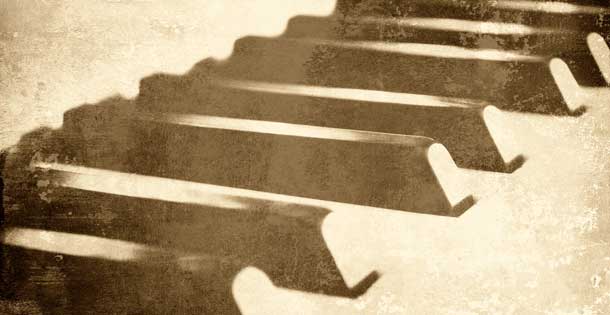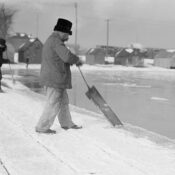The bus was late, today of all days. Might not make it before Bailey’s closed at 5:30, better walk instead. Each footstep on the rain-soaked cement mocked him like a giant pocket watch in slow motion—step, tick; step, tick; step, tick. He felt he’d gladly sell his soul to the devil to buy a few minutes.
He half-walked, half-stumbled past each familiar landmark—the old Vietnamese woman with her flower stand, 5:05; Mrs. Kasick walking Tony, the deaf poodle, 5:07; Abraham and Mohammed arguing politics over espresso at the café on 15th and Broad, 5:08; the jazz trio practicing in the basement of the old Freemont Hotel, 5:10. And finally at 5:15, there it was, the shining beacon that burst through the fog of his anxiety, the plate glass window of Bailey’s as it mirrored the orange and cobalt layers of twilight behind him.
But would she still be waiting? What if someone had gotten there first and fallen in love as he had? Although she’d arrived several weeks ago, the minute he’d laid eyes on her bewitching curves he knew in his soul they were destined to be together. Each night thereafter, her black and white contours transformed his dreams like something out of Casablanca.
He tremblingly crossed the threshold, held his breath, and cast a gaze toward his prize. Horror of horrors—she was gone. She had been right there, in the corner like a shrine, below the stained glass panel with the blue and gold angel, his good-luck omen. As he marched over to the sales desk to demand the name of the infidel who’d stolen his treasure, he caught a glimpse of her, looking forlorn in her unaccustomed spot next to the men’s room.
He approached her reverently. His ink-stained hands caressed the smoothness of the lid and almost shook as he ran a finger silently across the keys. He sat down at the bench and tried the pedals.
Benton Bailey, Jr., materialized almost magically next to him. “How are we doing today, Mr. King?”
“You moved her.”
“We had to rearrange inventory to make room for a new shipment. But she’s still here, waiting as usual. I was afraid you weren’t going to make it today. You’ve really taken a shine to this one, haven’t you?”
“The Yamaha wasn’t quite right. This little Steinway, though…” His voice trailed off, choked with emotion. “Mr. Bailey, sir, I think I’ve decided to take her.”
Bailey’s smallish eyes widened, and with his needlepoint nose and jaw hanging open, King thought he looked a little like a cod. King carefully counted out a wad of hundred-dollar bills. “Will this be enough for the down payment?”
Bailey beamed, “This is plenty for a down payment. But I thought your wife—”
“She’ll get used to the idea.”
He knew what her reaction would be. The blazing eyes of a Chinese dragon, disapproval oozing out every pore, hands on her hips where he swore they’d become permanently affixed as if by superglue. Her state of perpetual anger had transfixed her face into a wreath of wrinkles, all pointing downward toward the eternal fire and damnation where she was certain he was headed.
In his wallet he kept a picture of her from the days when they were dating, the blue-eyed smiling nymph with the auburn hair and a wicked sense of humor. He looked at it from time to time to remind himself that the demon now haunting his days had once possessed human form.
*****
On the walk home he felt like dancing. Let them mock. Tell him what a fool he was. He knew the angel in the stained-glass window wanted him to have the piano, and you just don’t argue with divine intentions.
When he was eight years old, he’d wanted a piano, or at least piano lessons. But his father refused. He said “music is for pansies” and forced his son to play football instead. And how King hated football. He could still taste the resentment filling his fragile boy psyche with acid memories that ate away at his self-confidence far into his adult years. Even now, as he longed to feel the cool sensuality of the ivory and ebony keys underneath his fingertips, he imagined his father’s stern lectures raining down on him from the cloud tops above.
Disapproval, disappointment, disillusionment. The three daughters, he called them, the fruit of his sorry existence. His flesh-daughters, Rachel and Renée, were their mother’s creation, springing like lemon trees from the manure-laden soil she’d so thoughtfully provided.
The trio of harpies, wife and daughters, were waiting when he climbed the three flights to his apartment. He’d hoped when he married them off, his children would move away and make a new life with husbands and children. And move, they did. About half a mile. He secretly wondered if the reason they spent so much time with him and their mother was at the encouragement of the exasperated husbands wishing for some respite of their own.
Rachel and Renée shared everything with their mother, including laughing away his dream of owning a piano. And so with great pleasure the first thing he told them coming through the door was, “I made a down payment on a piano.”
Silence. The ambient temperature seemed to drop ten degrees. Rachel chimed in first. “You’re kidding, aren’t you?”
He shook his head, sat down in his favorite chair, and grabbed the Times.
Renee was next. “Oh, Father, you can’t be serious. You don’t even know how to play the piano.”
“I’ll learn.” The sports section needed some revamping, he thought, as long as they didn’t take out his favorite horseracing. The writing just wasn’t what it used to be, at least the non-football part. He never looked at the football scores.
His wife took her turn at bat. “We’ve talked about this hundreds of times. We can’t afford it.”
“I’ve saved some money.”
“You mean to tell me you’re wasting our savings on a measly piano? How about retirement? Vacations? Something to leave the kids when we’re gone? For God’s sake, we need a new couch.”
“I started a piano fund when I was a boy and I’ve added to it every year. I put it in a savings account, it accrued some interest, it’s not a fortune, but it’s enough. Checks from my high school days working at Carl’s Grocery, a Christmas bonus here and there, proceeds from the sale of the old rust-bucket Chevy and some spare change. They’re going to deliver it next week.”
They chimed in all at once.
“Where are we going to put it?” (Wife)
“You know, you’ve been getting a little senile lately.” (Rachel)
“You’ll bother the neighbors. And you’ll be the laughingstock of the block.” (Renée)
“You’re too old to learn to play the piano.” (Wife)
Too old to learn to play the piano? That was the final straw. He dropped the paper, drew himself up to his full five-feet-nine, while a force like Mount St. Helens erupted in his veins.
He did not shout. His voice was almost a whisper, but it carried to the darkest shadows in the cobwebbed corners. “For fifty years I’ve been listening to people tell me how to run my life. You’re aiming too high, they said. You’re not smart enough to be an attorney, they said. You need to settle down and get married, they said. And I did what was expected. I’m an honest man who’s worked hard providing for you three.”
He was just getting warmed up, his lungs working like the bellows of the tracker organ at St. Paul’s Episcopal. “There comes a time in every man’s life when he should run with the wolves, fly with the eagles.” His wife would say he was full of clichés, if not something worse, but he didn’t care.
He paused and jabbed his finger in the air like a conductor’s baton. “The piano will go over in the corner where the television is now, and if any of you don’t like it, you can simply leave. I pay the rent, I put the food on the table and I don’t want any more arguments.”
He sat back down in his chair and resumed reading. There were whispered exchanges behind him, and then the door closed gently. His wife settled on the sofa and pulled her knitting from its basket. The only sound was the clicking of her needles.
He got up, turned on the radio and was pleased to hear a Beethoven piano sonata. Another fine omen. Victories were few and far between in his life, but he had the feeling the angel in the window at Bailey’s was watching over him. The piano would look quite at home in that corner. Like a proud black thoroughbred after winning the Kentucky Derby.
Become a Saturday Evening Post member and enjoy unlimited access. Subscribe now





Comments
Lovely!
Wonderful inspiring story!
Great story. Love the line about the three daughters, and the 50 years of listening to other people.
A charming story with a lesson in courage to face ones demons and come out the champion.
A lovely homage to the dreamers among us who have never given up their dreams. Hold fast and believe!
The emotions that you brought out for me while reading was wonderful, excitement, fear and then elation that he finally got something for himself. Well done!!
I loved this story. I wanted to cheer with him at the end – we have to chase our dreams.
Lovely story.
A nice beginning and reveal as to his hearts desire. And a lovely ending where all his dreams come true.
Very well written.
Very nicely done! A lot of meaning for much of humanity.
Very nicely done!
Stop telling me what I can not do. “There comes a time in every man’s life when he should run with the wolves, fly with the eagles.” Cliché (as his wife would say) or not life is short. Run and fly! What fun!
BV Lawson looks into a life that seems barely worthy of notice, removes the veil of mediocrity and reveals a treasure.
Wonderful story. For all of us out there who have struggled against all odds,This story gives us a victory.